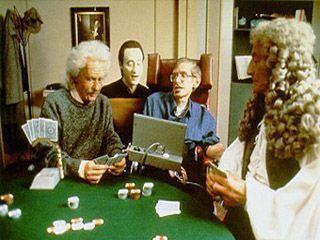This is my first book review, so bear with me while I compose my thoughts and opinions.
I am actually going to blog about two books on this posting. The reasons are that they are by the same author, I read them only a few days apart, and since they are basically about the same subject, I get them confused. The main difference between the two books is that “The Age of Spiritual Machines” is a bit older, published in 1999, and the other book is brand-spanking new (Sept 2005).
First, I have to express my admiration for the author, Ray Kurzweil. I first learned about him from my favorite radio program,
Science Friday. When I heard him being interview, I was at first shocked by some of the things he was saying, then it started to make sense to me. He was claiming that technology will change our lives so much, it does not even make sense to make predictions beyond the 2050s because we are just not able to comprehend the changes. This is why he calls his book “The Singularity is Near” – it is a reference to a black hole (aka singularity) beyond which you cannot see.
You can listen to his interview by going to:
http://www.sciencefriday.com/pages/2005/Dec/hour2_122305.htmlI am not going to go into more detail about the author, so you can learn a whole lot more about the author from:
http://www.kurzweiltech.com/aboutray.htmlBoth books started about the same way. They talk about the acceleration of technology and evolution. Kurzweil spends a great deal of time with charts and diagrams to prove his point that - even though we may not notice it - the rate technological advancement is accelerating. And even the rate of acceleration is increasing (but he kind of leaves that out of his predictions).
Kurzweil uses so many examples, starting from life itself. It took 4 billion years for the first single-celled organism to evolve - about a billion or so for the first multi-cellular organism. From then on, we had an explosion in evolution, with each new “era” getting shorter and shorter. As the most evolutionary advanced species that we know of, the only way to continue this evolutionary trend, Kurzweil argues, is to through technology. In fact, he states that technology might be the ultimate goal of evolution – the reason that the universe exists.
Kurzweil uses a lot of technology examples to support his idea of “Accelerating Return”. He starts out with the regular telephone, moves to cell phones, the internet, and alas blogs. Each one of these technologies, Kurzweil proves, came on quicker and were adopted by the masses faster than the previous. This trend will continue. Each time we hit a limit, such as the number of transistors that can possibly fit on a chip, we will move on to another technology and get the curve moving again. Telephones took several decades, the internet about 10 years, and blogs – well they have only been around for a handful of years and now yours truly’s using them.
In “The Singularity is Near”, Kurzweil talks about different stages of human evolution – Genetics, Robotics, and Nanotechnology – GNR. Genetics, well on it way, will first start out helping the sick but then move on to enhance our abilities and our food supply (Genetically Modified Organism – GMO – is already a hot topic, look for a post from me about this). Robotics already control most of our lives without us even realizing it – your banks will probably know when your credit card number was stolen before you do thanks to computers. Airplanes, banks, you name it, are all using a form of computer intelligence known as ‘soft AI’ – they can do many things humans can do, but quicker, more efficiently, and they don’t need healthcare. The real breakthrough, though, will be what is called ‘hard AI’ – a computer that can think, act, and understand on its own. The hardware that is required for this feat is probably already available in the newest generation of super computers. The software, however, still lags behind and requires the modeling of how our brain works in order reverse engineer its workings. According to Kurzweil, expect to see the birth of strong AI somewhere around the year 2020 or so.
By that time, Kurzweil argues, humans will have already started enhancing themselves through genetics and implants. The real revolution starts with the breakthrough of nanotechnology. Just read the science news, and you can already see so much potential for nanotechnology. Nanobots will be in our bodies and brains making us smarter, in our homes able to create anything we wish, and in our environment cleaning up the mess we are making.
I enjoy Kurzweil’s method of trying to explain what the future would be like by conjuring up another personality – Molly. He does this in both books, but takes it much farther in “The Singularity”. He chats with Molly at various times in her evolution, Molly 2009, Molly 2019, and Molly 2048. Sometimes, Molly from one time period talks to Molly of another. It is interesting to help answer many of the questions readers might have about what they are reading and what a “Kuzweillian” future would be like from a human perspective.
As you can probably tell, I agree with almost everything Kurzweil says in his books. I do not, however, agree with his religious philosophy. Kurzweil seems to take an agnostic view of God – meaning that (from what I gather from him) whether God exists or not is irrelevant to humans and our advancement. He does not, however, reject God which indicates that he is not an atheist. My personal belief in God and science will take at least one posting, if not more – so you’ll have to wait until I can get that composed before making a comparison.
Over all, I would definitely put “The Singularity is Near” on my “must read” list of books. Reading “The Age of Spiritual Machines” was somewhat more technical, if you like that kind of thing, but most of the book was summed up in “The Singularity”
“The Singularity is Near: When Humans Transcend Biology” by Ray Kurzweil
“The Age of Spiritual Machines: When Computers Exceed Computer Intelligence” by Ray Kurweil










